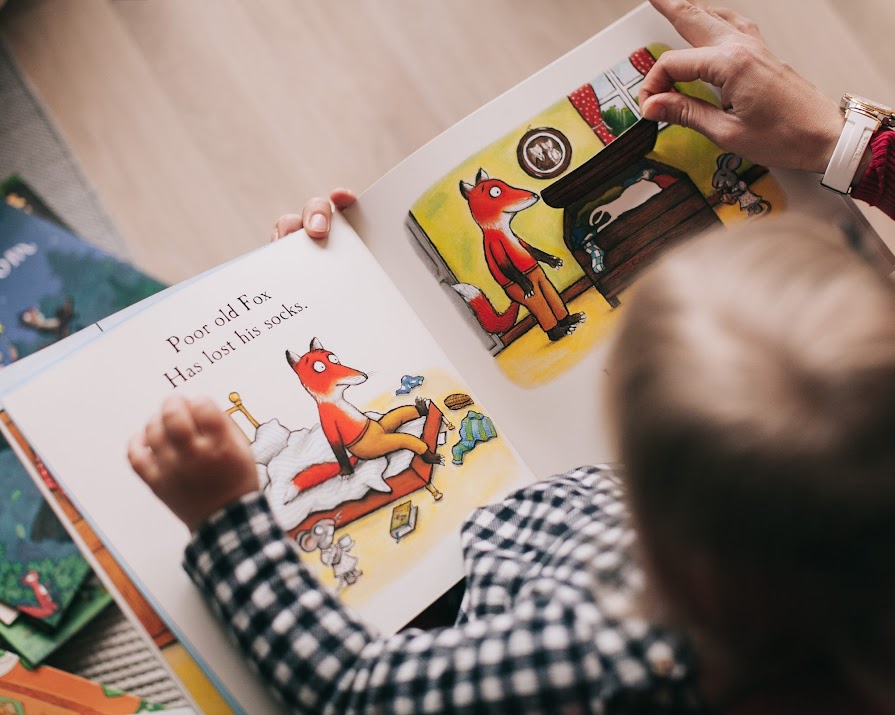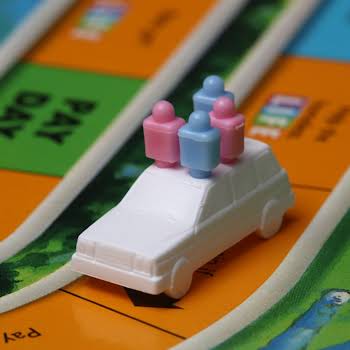Dad tales: ‘Apparently my 18-month-old daughter should be a genius by now’
By Laurence Mackin
16th Feb 2020
16th Feb 2020
Laurence Mackin has developed a new source of parenting anxiety after discovering a language known as ‘parentese’
Having a child snaps an awful lot of things into perspective, while giving you a whole new range of anxieties to keep your blood pressure at a constant, simmering boil. Problems in work and life’s more existential pressures tend to melt away when you are more concerned about the more immediate issue of how to feed a small but bottomless pit.
Sometimes your new worries also come with a fresh, competitive edge. Over Christmas we were staying with friends who have a son who is the same age as our daughter. When we sat down to dinner, imagine my horror when he picked up a fork and started feeding himself like some sort of bubbly little devil.
Happy enough to shovel his own way through his evening meal, he seemed to me like a wondrous new invention of science — a perpetual motion machine, say, or one of those toy birds that drinks water. There I was both wasting my time, and stunting my daughter’s growth and dexterity, by insisting that I wield the knife and fork.
We’ve rectified matters since and now, clad in a plastic smock that stops her outfits from being spattered, she negotiates her dinner with all the grace of a hippo. (Yes, totes adorbs.) Still, it’s a start, and it leaves me free to use up all this extra hands-free time to learn a language or a new skill or scroll through the football news.
Have you been saying icky wicky things and goo goo gagaing your way to bed time? Then you are a bad parent and all your efforts are for naught.
I got more anxiety recently when I read this story about how ‘parentese’ can turn your child into a genius. What’s that, you might ask, in your thick-tongued mumble. It’s essentially how most people speak to their children.
Have you used simple grammar and words with exaggerated sounds, maybe repeating yourself lots and lots of times? HAVE YOU? Used little, simple WORDS in a LOUD voice to make your baby GIGGLE? Well congratulations, because you’ve been using parentese.
And according to a study from the Institute for Learning & Brain Sciences, or I-LABS, at the University of Washington, it’s enormously beneficial for your child. Yes, science is here to judge you. How refreshing.
This is not, it must be noted, baby talk. Have you been saying icky wicky things and goo goo gagaing your way to bed time? Then you are a bad parent and all your efforts are for naught. Instead you should be using real words, elongated vowels and exaggerated tones of voice.
Patricia Kuhl, I-LABS co-director and professor of speech and hearing sciences, says somewhat smugly: “We’ve known for some time that the use of parentese is associated with improved language outcomes. But we didn’t know why… We now think parentese works because it’s a social hook for the baby brain — its high pitch and slower tempo are socially engaging and invite the baby to respond.”
Researchers at the University of Washington got 48 families and taught half of them to speak parentese to their children. After 18 months, they studied the children’s communication and found that on average they had a 100-word vocabulary.
As for the babies who were stuck with parents whose lingua franca is baby talk? They only had 60 words.
This then becomes the cool, clear source of my fresh anxiety. My child talks a lot but I’m not entirely sure any of it could be classified as “words”. And she’s 18 months old. It’s more a random, guttural collection of bloops, bleeps, points and “Hiyas”. (That’s one at least; suck it, researchers.)
So despite reading my child whatever books she wants and the football news every day while she shovels food into her, her vocabulary is nowhere near the 60-word mark.
But then, while rereading the story, I realised that the kids weren’t 18 months old, but were coached for 18 months in parentese. Which means they could be any age. Damn it, they are probably teenagers. What sort of study is this anyway? My child is still a genius. In your face, scientists.
Now, any chance you have a study on how to use a fork?
Parenting tip no 11
As I have written before, it is very easy to swindle your child. Just this week, she was refusing to eat avocado and was staring at it as if it was a Heinz Tomato Ketchup Chocolate Truffle. Then my wife put it on toast, and my daughter wolfed it down. Remember, don’t take no for an answer: stick to tricking your child. That’s how you build up trust.
Photo: Pexels
Read more: ‘My wife and I are competing for our daughter’s affection’
Read more: ‘We tried to curb the amount of toys our daughter got for Christmas. We failed miserably’
Read more: ‘I have immense admiration, nay an almost religious awe, for parents who take young children abroad’























